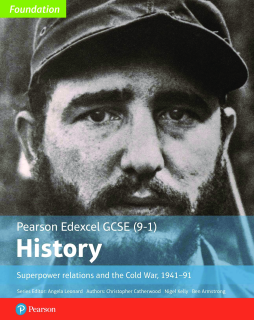
BOOK
Edexcel GCSE (9-1) History Foundation Superpower relations and the Cold War, 1941_91 Student Book
Christopher Catherwood | Nigel Kelly | Ben Armstrong
(2018)
Additional Information
Book Details
Abstract
Edexcel GCSE (9-1) History Foundation Superpower relations and the Cold War, 1941–91 Student Book
Table of Contents
| Section Title | Page | Action | Price |
|---|---|---|---|
| Front Cover | Front Cover | ||
| Contents | 3 | ||
| Timeline | 6 | ||
| Chapter 1: The origins of the Cold War, 1941–58 | 8 | ||
| 1.1: Early tensions between East and West | 9 | ||
| Ideological differences between East and West | 9 | ||
| The significance of the Tehran, Yalta and Potsdam conferences | 11 | ||
| US–Soviet relations 1945–46: the wartime alliance unravels | 14 | ||
| The creation of Soviet satellite states in Eastern Europe | 17 | ||
| 1.2: The development of the Cold War | 20 | ||
| The impact of the Truman Doctrine and Marshall Plan | 20 | ||
| The formation of Cominform and Comecon | 23 | ||
| The 1948 Berlin Crisis – testing the West | 24 | ||
| The formation of East and West Germany | 26 | ||
| The creation of two armed camps | 27 | ||
| 1.3: The Cold War intensifies | 29 | ||
| The arms race: Soviet Union v. USA, 1950–58 | 29 | ||
| The Hungarian Uprising*, 1956 | 32 | ||
| International reaction to the Soviet invasion of Hungary | 34 | ||
| Recap page | 37 | ||
| Writing Historically | 38 | ||
| Chapter 2: Cold War crises, 1958–70 | 40 | ||
| 2.1: Berlin 1958–63: Increased tension and the impact of the Berlin Wall | 41 | ||
| The refugee problem in Berlin, 1958 | 41 | ||
| Khrushchev’s Berlin Ultimatum | 42 | ||
| The summit meetings of 1959–61 | 43 | ||
| Building the Berlin Wall | 45 | ||
| 2.2: The Cuban Missile Crisis | 49 | ||
| The Cuban Revolution | 49 | ||
| The USA intervenes in Cuba: the ‘Bay of Pigs’ incident | 50 | ||
| The Cuban Missile Crisis | 52 | ||
| The consequences of the Cuban Missile Crisis | 55 | ||
| 2.3: Czechoslovakia, 1968–69 | 58 | ||
| Opposition to Soviet control | 58 | ||
| The ‘Prague Spring’ | 58 | ||
| The Soviet reaction | 59 | ||
| The impact of the ‘Prague Spring’ and the Soviet invasion | 61 | ||
| Recap page | 63 | ||
| Writing Historically | 64 | ||
| Chapter 3: The end of the Cold War, 1970–91 | 66 | ||
| 3.1: Attempts to reduce tension between East and West, 1969–79 | 67 | ||
| Détente | 67 | ||
| SALT 1 | 69 | ||
| 3.2: Flashpoints in superpower relations, 1979–84 | 74 | ||
| The Soviet invasion of Afghanistan, 1979 | 74 | ||
| Ronald Reagan and the ‘Second Cold War’ | 77 | ||
| 3.3: The collapse of Soviet control in Eastern Europe, 1985–91 | 80 | ||
| Gorbachev’s new thinking | 80 | ||
| The end of the Soviet hold on Eastern Europe | 83 | ||
| The significance of the fall of the Berlin Wall | 84 | ||
| Recap page | 87 | ||
| Writing Historically | 88 | ||
| Writing analytical narrative | 90 | ||
| The difference between a story and a narrative account that analyses | 90 | ||
| Superpower relations and the Cold War, 1941–91: Preparing for your exam | 92 | ||
| Answers | 99 | ||
| Index | 100 | ||
| Acknowledgements | 102 |
